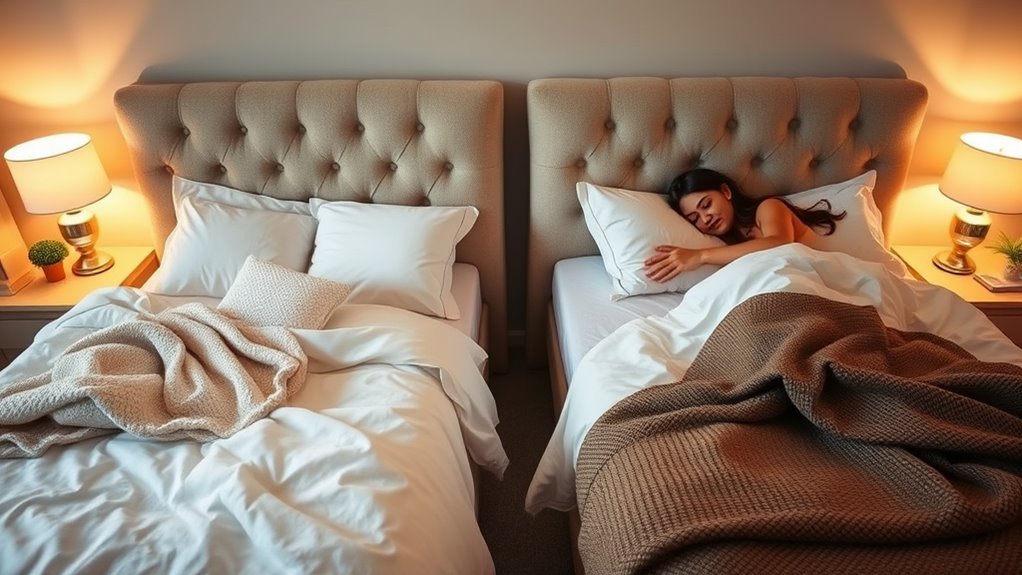Choosing to sleep separately doesn’t mean your relationship is failing. It can improve your sleep quality by reducing disturbances like movement or snoring, helping both of you feel more rested and emotionally connected. Separate beds allow you to personalize your sleep environment, which boosts overall well-being. Many couples find that this arrangement enhances intimacy and reduces conflicts over sleep issues. If you want to find out how to navigate sleep divorce effectively, there’s plenty more to contemplate.
Key Takeaways
- Separating beds can improve sleep quality, leading to increased energy and better emotional connection during the day.
- It challenges traditional norms, showing that intimacy and sleep comfort are compatible with separate sleeping arrangements.
- Personalizing sleep environments reduces disruptions from snoring or movement, minimizing nightly conflicts.
- Maintaining flexibility, such as sharing beds on weekends, helps preserve emotional closeness while benefiting from separate sleep spaces.
- Prioritizing individual sleep needs promotes overall well-being, reducing irritability and fostering a healthier relationship.

Have you ever wondered if sleeping separately from your partner could actually improve your quality of rest? It’s a question more couples are asking as they realize that traditional bed sharing doesn’t always lead to a restful night. While bed sharing has long been seen as a symbol of intimacy, it can sometimes disrupt sleep quality instead of enhancing it. If you find yourself tossing and turning, waking up exhausted, or feeling less connected during the day, separating your beds might be worth considering. Many couples report that when they sleep apart, they wake up more refreshed, less irritable, and better able to engage during waking hours. This isn’t about losing intimacy; it’s about optimizing sleep so you can be your best selves for each other.
Sleeping apart can lead to better rest, increased energy, and enhanced connection during the day.
The idea of sleep divorce isn’t new, but it’s gaining popularity because it challenges the assumption that sharing a bed is essential for a healthy relationship. Instead, it recognizes that individual sleep needs vary widely. For example, one partner might be a light sleeper, easily disturbed by movement, snoring, or even different sleep schedules. The other might have insomnia or a restless sleep pattern. In these cases, bed sharing can lead to constant interruptions, reducing sleep quality for both. When you sleep separately, each of you can create a sleep environment tailored to your preferences—whether that means a firmer mattress, blackout curtains, or a cooler room—improving sleep quality overall. Additionally, understanding the importance of personalized sleep environments can help couples find solutions that work best for their unique needs.
Choosing separate beds doesn’t mean sacrificing intimacy. Many couples find that when they aren’t exhausted from poor sleep, they’re more attentive and affectionate during waking hours. Some even keep a “sleep schedule” where they sleep apart during the workweek but share a bed on weekends for closeness. This flexibility helps maintain emotional bonds while prioritizing restorative sleep. It’s also easier to address sleep issues directly, like snoring or restless leg syndrome, without feeling guilty about disturbing your partner. Over time, couples often discover that this arrangement reduces nightly conflicts over sleep habits and creates a more peaceful, restorative environment for both.
Ultimately, prioritizing sleep quality can be a game-changer for your relationship. If bed sharing isn’t working despite your best efforts, exploring sleep divorce could lift both of you from exhaustion and frustration. Remember, good sleep isn’t just about comfort; it’s about feeling energized, emotionally stable, and better equipped to connect. Taking control of your sleep environment and habits by sleeping separately might be the key to a healthier, happier relationship—one where both partners wake up feeling rested, refreshed, and more present for each other.
Frequently Asked Questions
How Can Couples Maintain Intimacy With Separate Beds?
You can maintain intimacy with separate beds by creating shared bedtime routines, like morning cuddles or evening talks, to stay connected. Keep your sleep environment cozy and inviting, ensuring both beds feel like a safe space for intimacy. Regularly communicate about your needs and feelings, making efforts to prioritize quality time together. This approach helps you nurture your relationship while enjoying the benefits of separate sleeping arrangements.
What Are the Psychological Effects of Sleep Divorce?
Sleep divorce can positively impact your emotional well-being by improving sleep quality, leading to reduced stress and irritability. You might feel more rested and emotionally balanced, which helps strengthen your relationship. However, some may experience feelings of loneliness or disconnection initially. Overall, separating beds can promote healthier sleep patterns and emotional stability, fostering a better mental state that benefits both your individual well-being and your partnership.
How Should Partners Discuss Sleep Arrangements?
You should approach discussing sleep arrangements with humor and honesty. Start by sharing your bedtime routines and how a different sleep environment might improve both your rest and relationship. Make it clear that separate beds aren’t a punishment but a way to boost sleep quality. Keep the tone light, listen actively, and find common ground—because better sleep leads to happier mornings and a stronger bond.
Is Sleep Divorce Suitable for All Relationship Types?
Sleep divorce isn’t suitable for all relationship types, but it can benefit many. If you value co-sleeping benefits like intimacy and comfort, this approach might not work. However, if customizing your sleep environment helps improve rest and reduces conflicts, separate beds could be ideal. Consider your relationship’s needs and communicate openly, tailoring arrangements that foster better sleep and overall connection without compromising intimacy.
What Are Alternatives to Complete Separation?
Like a knight shying from old bed sharing myths, you can try alternatives to full separation. Consider different mattress types—memory foam or adjustable beds—that cater to individual needs without losing intimacy. You might also explore side-by-side sleeping, using separate blankets or sleep positions, to reduce disturbances. These options help balance comfort and closeness, proving that you don’t need to sleep apart entirely to enjoy restorative rest and a healthy relationship.
Conclusion
Remember, sometimes, it’s better to sleep apart to keep the spark alive. When you prioritize your sleep and well-being, your relationship can thrive instead of just survive. Don’t be afraid to take that leap and try separate beds if it means better nights and brighter days together. After all, a happy, well-rested partner is a partner who’s ready to face anything — because in the end, your peace of mind is priceless.









